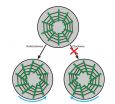Smartphone face recognition 'improved' by copying the brain
2015-03-31
(Press-News.org) Face recognition security on smartphones can be significantly improved if users store an 'average' photo of themselves, according to new research by scientists at the University of York.
A research team led by Dr David Robertson, of the Department of Psychology's FaceVar laboratory at York, found that combining different pictures of the user, rather than a single 'target' image, leads to much better recognition across all kinds of daily settings. The research is published in the journal PLOS ONE.
The researchers examined the performance of the 'face unlock' system on Samsung Galaxy phones. They found that the system was generally very good at rejecting imposters, but that it often failed to recognise the genuine owner too. However, performance could be greatly improved, often to perfect levels, if users stored an 'average' of their own photos - formed by morphing together several different photos of the user.
The idea for this technique comes from studies of human face recognition. It is understood that the brain forms abstract representations of the faces it knows, and that people are very good at recognising their family and friends over a range of conditions. If it is possible to copy these representations, then automatic face recognition can improve. Using 'average' images is a simple way to do this.
Dr Robertson said: 'We chose to study the Samsung Galaxy because it is a very popular phone which comes with working face recognition technology. However, we expect this technique to work across a wide range of phones and other automated recognition devices. It is very interesting that performance can be so much improved by copying a simple trick performed by the brain."
INFORMATION:
ELSE PRESS RELEASES FROM THIS DATE:
2015-03-31
Researchers at the Mechanobiology Institute (MBI) at the National University of Singapore have discovered that the inherent 'handedness' of molecular structures directs the behaviour of individual cells and confers them the ability to sense the difference between left and right. This is a significant step forward in the understanding of cellular biology. This discovery was published in Nature Cell Biology on 23 March 2015.
Cellular decision making
Our bodies are made up of hundreds of different types of cells, each of which performs a unique and highly specialized ...
2015-03-31
Researchers from the UK and Malaysia have detected a human fingerprint deep in the Borneo rainforest in Southeast Asia. Cold winds blowing from the north carry industrial pollutants from East Asia to the equator, with implications for air quality in the region. Once there, the pollutants can travel higher into the atmosphere and impact the ozone layer. The research is published today in Atmospheric Chemistry and Physics, an open access journal of the European Geosciences Union (EGU).
Rainforests are often associated with pure, unpolluted air, but in Borneo air quality ...
2015-03-31
WASHINGTON-- The Society for Public Health Education (SOPHE) proudly announces the publication of a Health Education & Behavior (HE&B) supplement devoted to the latest research and practice on policy and environmental approaches to foster healthy communities. The April 2015 supplement, "The Evidence for Policy and Environmental Approaches to Promoting Health," comprises a dozen peer-reviewed articles and two perspectives examining the state-of-the-evidence on what's working and what's needed at the community, institutional and societal levels to promote good health across ...
2015-03-31
A world first study revealing the presence of two antibodies in a sub-group of children experiencing their first episode of psychosis affirms a longstanding recognition that auto-immune disorders play a significant role in psychiatric illness.
Antibodies defend the body against bacterial, viral, and other invaders but sometimes the body makes antibodies that attack healthy cells. In these cases, autoimmune disorders develop. These include conditions such as multiple sclerosis (MS), rheumatoid arthritis and Type 1 diabetes.
This 'immune hypothesis' is supported by new ...
2015-03-31
Almost every pig carries harmless strains of the S. suis bacterium - such strains are known as 'commensal' strains. However, a more virulent group of strains of the bacteria also exist, which cause disease in pigs worldwide and are a major driver of antibiotic use for prevention. Increasingly, this group of strains is also implicated in serious human diseases such as meningitis and septicaemia.
In order to understand the genetic basis of disease in S. suis, an international study, led by the Bacterial Respiratory Diseases of Pigs-1 Technology (BRaDP1T) consortium, examined ...
2015-03-31
New research from the University of Toronto has scientists re-thinking how a lethal fungus grows and kills immune cells. The study hints at a new approach to therapy for Candida albicans, one of the most common causes of bloodstream infections.
Previously, scientists thought that Candida albicans spread by changing from a single, round cell to a long string of cells, or filaments. They thought this shape change allowed the fungus to move through the bloodstream and let its filaments penetrate tissues and destroy immune cells.
But the new study, published today in Nature ...
2015-03-31
Survey responses from 19,000 people in 18 European countries, including the UK, showed that "the notion that big welfare states are associated with widespread cultures of dependency, or other adverse consequences of poor short term incentives to work, receives little support."
Sociologists Dr Kjetil van der Wel and Dr Knut Halvorsen examined responses to the statement 'I would enjoy having a paid job even if I did not need the money' put to the interviewees for the European Social Survey in 2010.
In a paper published in the journal Work, employment and society they ...
2015-03-31
PISCATAWAY, NJ - Children who get a taste of their parents' wine now and then may be more likely than their peers to start drinking by high school, according to a new report in the Journal of Studies on Alcohol and Drugs.
Researchers found that, of 561 students in a long-term study, those who'd "sipped" alcohol by sixth grade were five times more likely than their peers to down a full drink by the time they were in high school. And they were four times more likely to have binged or been drunk.
The findings do not prove that early sips of alcohol are to blame, said lead ...
2015-03-31
Philadelphia, PA, March 31, 2015 - Ultrasound technology has evolved dramatically in recent years. A group of noted obstetricians and gynecologists maintain that ultrasound is more cost-effective and safer than other imaging modalities for imaging the female pelvis and should be the first imaging modality used for patients with pelvic symptoms. Writing in the American Journal of Obstetrics & Gynecology and supporting an American Institute of Ultrasound in Medicine (AIUM at http://www.AIUM.org) initiative, they urge practitioners to "put ultrasound first."
In 2012, the ...
2015-03-31
As the United States faces transplant waiting lists that continue to grow longer over time, there is increasing debate about the proper way to incentivize living donations. Transplant professionals are trying to find ways to eliminate any financial disincentives without crossing the line to paying for organs. A new article published in the American Journal of Transplantation highlights possible solutions discussed by leaders within the American Society of Transplantation (AST) and the American Society of Transplant Surgeons (ASTS) at a recent workshop.
Due to organ shortages, ...
LAST 30 PRESS RELEASES:
[Press-News.org] Smartphone face recognition 'improved' by copying the brain

